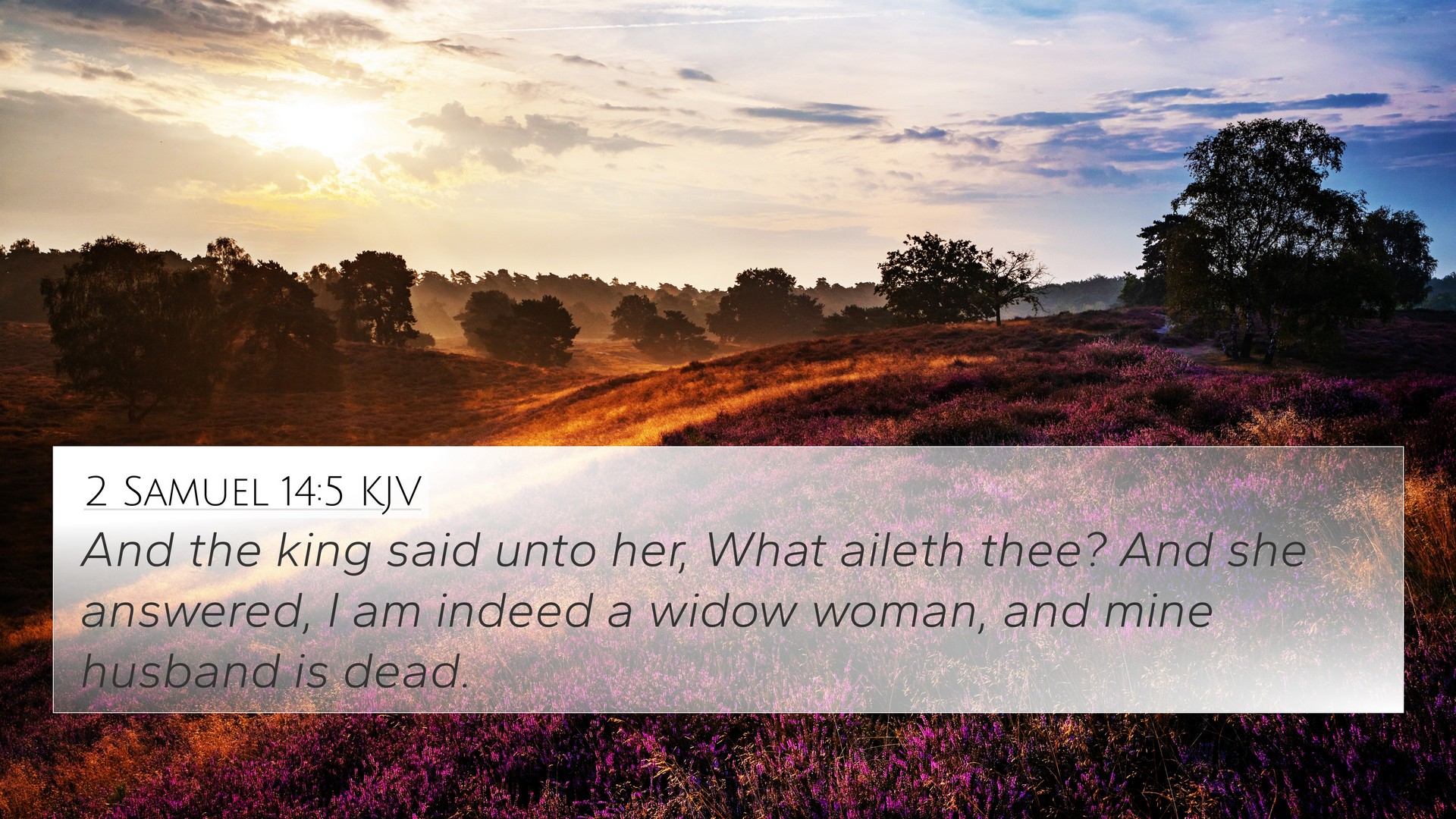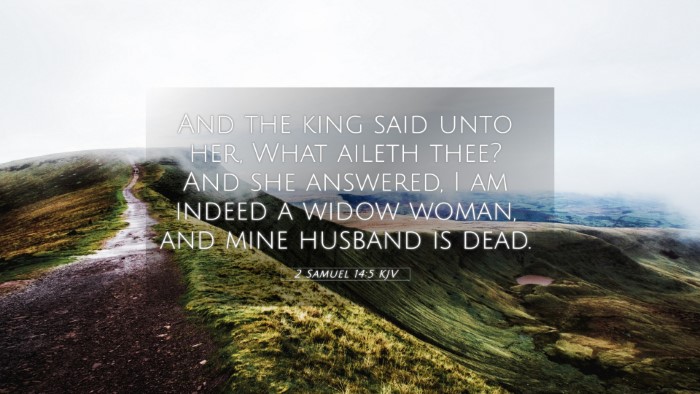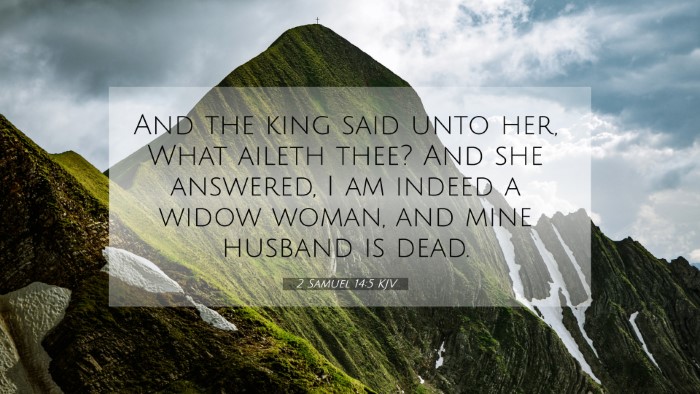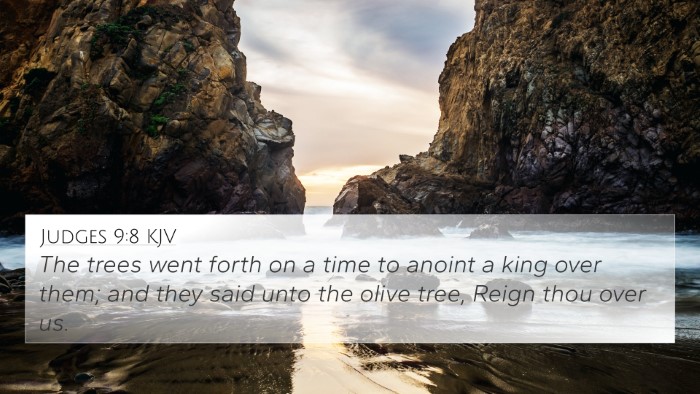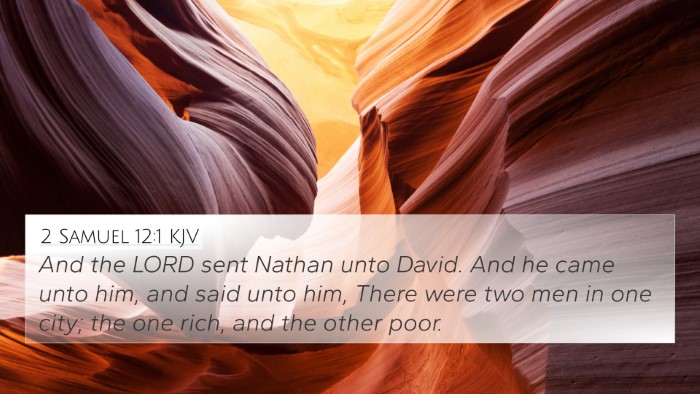Understanding 2 Samuel 14:5
Bible Verse: 2 Samuel 14:5 - "And the king said unto her, What aileth thee? And she answered, I am indeed a widow woman, and my husband is dead."
Summary of Verse Meaning
This verse takes place in the context of a conversation between King David and a woman from Tekoa who has come to plead for her family. David's inquiry about her distress highlights his royal duty to listen and assess the problems of his subjects. This passage, as noted by various commentaries, signifies themes of mourning, loss, and the search for justice in a broken world.
Insights from Public Domain Commentaries
Matthew Henry's Commentary
Matthew Henry observes that the woman’s introduction of her identity as a widow serves to elicit compassion from David. He notes that her situation illustrates the broader theme of vulnerability in society. The loss of her husband positions her as a figure that represents many who have lost their loved ones and seek help in their mourning.
Albert Barnes' Notes
Albert Barnes emphasizes the importance of class and status in this verse. By defining herself as a widow, the woman conveys her dire straits and invokes David’s responsibility as a king to protect the defenseless. This interaction is not merely about her personal loss but symbolizes the king’s role in confronting societal issues and enacting justice.
Adam Clarke's Commentary
Adam Clarke expands on the emotional context of the verse, highlighting that the woman’s plea represents the voice of the marginalized. He suggests that her widowhood not only denotes personal loss but also a call for action, as she seeks redress for the injustices faced by her family. Clarke argues that such petitions are crucial for a ruler to maintain order and compassion in his kingdom.
Thematic Connections and Cross-References
2 Samuel 14:5 serves as a poignant reminder of the human condition, loss, and the search for justice. Here are some connections and themes that resonate with this verse:
- Psalm 68:5 - "A father of the fatherless, and a judge of the widows, is God in his holy habitation." This verse highlights God's protective role over the vulnerable.
- James 1:27 - "Pure religion and undefiled before God and the Father is this, To visit the fatherless and widows in their affliction." It emphasizes the importance of caring for those in need.
- Ruth 1:1-5 - The narrative of Ruth similarly portrays the struggles of widows and their search for security.
- Luke 18:1-8 - The parable of the persistent widow underscores the importance of advocacy and justice.
- Isaiah 1:17 - "Learn to do well; seek judgment, relieve the oppressed, judge the fatherless, plead for the widow." This charge aligns with the ministry expected of those in power.
- 1 Timothy 5:3 - "Honor widows that are widows indeed." This stresses the church’s responsibility toward those in similar circumstances.
- Proverbs 15:25 - "The Lord will destroy the house of the proud: but he will establish the border of the widow." God's promise of protection for the widowed is echoed here.
Inter-Biblical Dialogue
Examining 2 Samuel 14:5 in light of other scriptures opens a rich dialogue about the responsibilities of leadership and the care of the vulnerable. The parallels in the texts highlight recurring themes across both the Old and New Testaments, showcasing an overarching biblical narrative concerned with justice and mercy.
How This Verse Connects to Broader Themes
Through cross-referencing biblical texts, we see that 2 Samuel 14:5 is not only about a personal plight but also a call for justice and compassion that resonates throughout scripture. Tools and methods for understanding these connections include:
- Utilizing a bible concordance to find similar themes across scripture.
- Engaging in bible cross-reference study techniques to create links between similar narratives.
- Identifying bible verses related to specific themes such as widowhood, justice, and leadership.
Conclusion
In conclusion, the plea of the widow in 2 Samuel 14:5 serves not only as a personal story but also as a profound lesson on justice, mercy, and the responsibilities of leaders towards those in need. By connecting this verse with others through thematic analysis and cross-referencing, one gains a holistic view of biblical teachings on compassion and care for the vulnerable.
